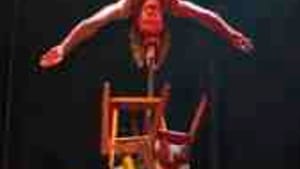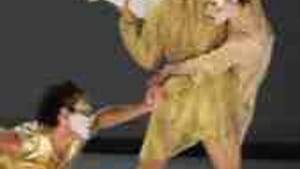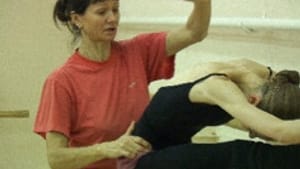Dance
708 results
Page 52

Thirdbird's "Seen & Heard'
Things are tough all over
In “Seen & Heard,” choreographers revealed their disequilibrium with the chaos of the world, exposed the conventions of human relationships and uncovered the life of a dancer who's compelled to connect with his audience.
Articles
3 minute read

"Traces': Dazzling spectacle from 7 Fingers
Something completely different (and without a safety net)
The brilliant dancer/acrobats of 7 Fingers seek a new form of performing art. Their Traces— part circus act, part dance theater, part cabaret— is a dizzying, dazzling spectacle that defies definition.
Articles
4 minute read

John Jasperse's "Canyon' at the Fringe Festival
Confronting the inexplicable
John Jasperse's unorthodox Canyon seeks to alter the way we view performance, not to mention our states of consciousness. He jars our expectations of experience and reality, especially in temples of art on avenues of the arts.
Articles
4 minute read

Headlong Dance Theater's "Red Rovers'
None dare call it dance
In Red Rovers, Headlong Dance Theater once again comes up with a clever setup that leads nowhere. And would it kill them to do a little more dancing?
Articles
2 minute read

"Dancing Dead' by Brian Sanders
Waiting for Sanders to evolve
In Dancing Dead, choreographer Brian Sanders has developed a brilliant and original concept. Still, if you've seen one Sanders piece, you've seen the limits of his movement vocabulary.
Articles
4 minute read

Parkour: Daredevil movement at the Fringe
Somersault across a dumpster? Welcome to the urban world of Parkour
Dancers who leap off tenement rooftops and parking garages? Don't laugh. Hip-hop transformed dance a generation ago; the new movement style called Parkour may yet do the same.
Articles
4 minute read

BalletX Summer Series (2nd review)
Night of the dense metaphors
Where Roger Jeffrey employed dance to explore dense metaphors concerning individuals and crowds, Amy Seiwert displayed dance at its most powerful for distilling the essence of remembered pain.
Articles
5 minute read

BalletX Summer Series (1st review)
The BalletX formula: Compose seriously, dance joyfully
BalletX's summer program demonstrated just how accomplished this spunky company has become in a short time. Whether they're creating their own work or bringing in intriguing experimenters from around the world, the BalletXers rarely produce anything that isn't totally professional and excitingly new.
Articles
4 minute read

The genius of Raphael Xavier
One man's single unifying endeavor
Two autobiographical works by Raphael Xavier suggest a choreographer whose vision extends far beyond the necessarily narrow world of a dancer.
Articles
4 minute read

Russian and African dancers: A common thread
Africa's ‘Soviet ballet'
Russia and the West African nation of Guinea are two countries with little in common. Yet as I learned first-hand, their mutual passion for dance, and their approach to training dancers, share remarkable similarities.
Articles
5 minute read